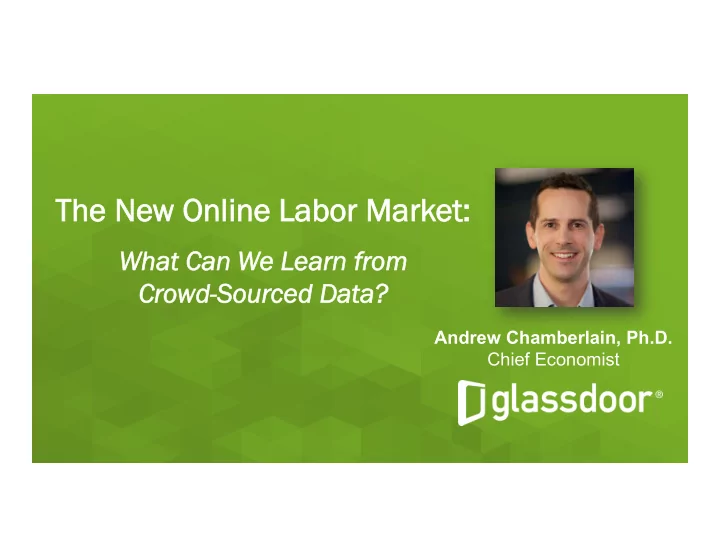

The The Ne New Online w Online Labo Labor Mar r Market: t: What Can W What Can We Learn fr e Learn from m Cr Crowd-So wd-Sourced Data? urced Data? Andrew Chamberlain, Ph.D. Chief Economist
What do these 5 companies have in common? 2
3
Today, I want to leave you with one big idea. 4
Crowd-sourced data can offer powerful insights about the labor market, and creates new opportunities for economists in the tech world. 5
Key questions 1. What is Glassdoor ? How do we collect data? 2. What are some research insights from Glassdoor data? 3. What can economists contribute in the tech world of crowd-sourced data? 6
What is Glassdoor ? 7
to help people everywhere find � Mission: � a job and company they love � 8
Powerful Combination � Reviews � CEO Approval � JOBS � + � Salaries � Interviews � “Exceptional benefits package” � Benefits � Photos � 9
The Glassdoor Marketplace Content Jobs + UGC Contributes Attracts Employers Job Seekers Hire Great Find the jobs Talent they love! Builds Audience Community Job Seekers & Employers 10
10M � 445K � 190 � 29M � 50+% � Monthly UUs � Reviews � Companies � Countries � Mobile � 11
Let’s look at the data 12
How We Collect Data The Give-to-Get Model: Leave a salary Job search Find or review to get online Glassdoor access. This provides a powerful economic incentive to contribute, and overcomes many selection bias problems . 13
But are the data representative ? 14
“Good” salary data should look like this Salaries are famously log-normally distributed Salary 15
Glassdoor salaries look Census Bureau salaries like this: look like this: 16
“Good” online reviews data should look like this: Not this: A balanced assessment Polarized by positive and of pros and cons. negative selection bias. 17
Individual company reviews look like this For most employers, we get a balanced assessment of pros and cons. 18
Combining those three Combining all companies on Glassdoor we get: employers we get: .8 .6 Density .4 .2 0 1 2 3 4 5 employerOverallRating It’s the “central limit theorem” in action! 19
Takeaways • Need to provide economic incentives to overcome selection bias. • To get balanced online reviews, you need a balanced survey platform. • Good institutions allow us to do do research with our data. 20
What are some research ideas using Glassdoor data? 21
Let’s look at 5 research ideas 22
#1: Do companies with satisfied employees outperform the stock market? • Yes. Portfolios of Glassdoor’s “Best Places to Work” dramatically outperform the S&P 500. • But is it causal or just correlation? • Using an IV strategy, we identified a causal effect of employee satisfaction on financial performance. Sources: Chamberlain, Andrew (2015). “Does Company Culture Pay Off? Analyzing Stock Performance of ‘Best Places to Work’ Companies,” Glassdoor Economic Research report . Huang, Minjie et al. (2015). “Family Firms, Employee Satisfaction, and Corporate Performance,” Journal of Corporate Finance , Vol. 34, pp. 108-127. 23
#2: Does money buy happiness at work? • 221,000 Glassdoor users contributed both a company review and salary report . • Effect of wages on job satisfaction is small . 10% higher wages => 1% higher satisfaction. • Key factors: Culture & values ; career opportunities ; and senior leadership . Source: Mario Nunez, “Does Money Buy Happiness? The Link Between Salary and Employee Satisfaction,” Glassdoor Research, June 2015. 24
Salary is not the main driver of job satisfaction 25
#3: Do more difficult job interviews improve job matching? • 154,000 Glassdoor users submitted an interview review and a company review . • In all six countries, harder interviews predict better job matches . • But there’s an optimal difficulty : 4 out of 5 stars. Source: Andrew Chamberlain and Ayal Chen-Zion, “Do Difficult Job Interviews Lead to More Satisfied Workers? Evidence from Glassdoor Reviews, ” Glassdoor Economic Research report , October 2015. 26
27
28
#4: Are hiring delays getting longer? Why? • Data on hiring process length from 344,000 Glassdoor interview reviews in six countries. • Delays have grown significantly since 2009, even after controlling for business cycle, industry and more. (+3.3 to 3.7 days) • Main driver : Employers using more screens like background checks, skills tests, presentations, etc. for more complex jobs. Source: Andrew Chamberlain, “Why Is Hiring Taking Longer? New Insights from Glassdoor Data, ” Glassdoor Economic Research , June 2015. 29
30
31
32
#5: Who Competes for Workers in the Labor Market? • Conventional wisdom : Companies compete for talent within an industry or city . • Using job-click behavior on Glassdoor, we studied the “ revealed network ” of competition for talent. • Many surprises in who competes for workers. Some employers are hugely influential in the labor market. Source: Ayal Chen-Zion, “Who Competes for Job Seekers? Visualizing the Labor Market with Glassdoor Data, ” Glassdoor , September 2015. 33
America’s Most Influential Employer: Oracle is the 800-pound gorilla of the labor market. 34
Amazon competes for workers both at tech companies and local Seattle firms. 35
Target’s wage offers are more influential at home improvement stores than traditional retail. 36
What can economists contribute to the tech world of crowd-sourced data? 37
Why Tech Companies Love Economists • Most “data scientists” are engineers and physicists. Not trained in social data. • Economists’ tools are designed to identify causal links in human behavior –online or offline. • Economists have a model. That helps us ask the right questions and see the big picture in messy data. 38
Thank you! 39
Qu Questio stions? Ple ns? Please ase re reach o ach out. t. andrew.chamberlain@glassdoor.com @adchamberlain Andrew Chamberlain, Ph.D. Chief Economist glassdoor.com/research #Glassdoor
Recommend
More recommend